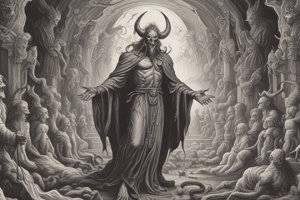Podcast
Questions and Answers
The writer of Hebrews believed the incident in Genesis 22 to be the primary background for understanding Jesus' sonship and sacrificial death.
The writer of Hebrews believed the incident in Genesis 22 to be the primary background for understanding Jesus' sonship and sacrificial death.
True (A)
The Septuagint translates the Hebrew Yahid as 'only begotten' in Genesis 22.
The Septuagint translates the Hebrew Yahid as 'only begotten' in Genesis 22.
False (B)
The King James Version translates the Greek word 'Monogenes' as 'only begotten'.
The King James Version translates the Greek word 'Monogenes' as 'only begotten'.
False (B)
The Vulgate's Unigenitus means 'firstborn' in Latin.
The Vulgate's Unigenitus means 'firstborn' in Latin.
The translators of the King James Version did not know Latin.
The translators of the King James Version did not know Latin.
The Aryan view was that Jesus was not a created being.
The Aryan view was that Jesus was not a created being.
The New King James Version has abandoned the traditional translation 'only begotten'.
The New King James Version has abandoned the traditional translation 'only begotten'.
The term 'Monogenes' directly refers to Jesus' virgin birth.
The term 'Monogenes' directly refers to Jesus' virgin birth.
Faith is only necessary when we have a positive experience with God.
Faith is only necessary when we have a positive experience with God.
The day of judgment will be a positive experience for unbelievers.
The day of judgment will be a positive experience for unbelievers.
The love referred to in the passage is exclusively for God.
The love referred to in the passage is exclusively for God.
The speaker recommends adopting rational propositions about God that they know are true through experience.
The speaker recommends adopting rational propositions about God that they know are true through experience.
The speaker is certain that God has abandoned them in their current situation.
The speaker is certain that God has abandoned them in their current situation.
The speaker is confident in their interpretation of the Bible passage without checking other translations.
The speaker is confident in their interpretation of the Bible passage without checking other translations.
The passage suggests that believers will fear the day of judgment.
The passage suggests that believers will fear the day of judgment.
The speaker is preaching their own translation of the Bible passage.
The speaker is preaching their own translation of the Bible passage.
In the Greco-Roman world, there was a strong connection between religion and morality.
In the Greco-Roman world, there was a strong connection between religion and morality.
The Bible teaches that to get in touch with God, one might engage in activities that are considered sinful.
The Bible teaches that to get in touch with God, one might engage in activities that are considered sinful.
The concept of God's holiness is unique to the God of Moses.
The concept of God's holiness is unique to the God of Moses.
The New Testament teaches that lustful looks are equivalent to adultery.
The New Testament teaches that lustful looks are equivalent to adultery.
The apostle Paul commended the Thessalonians for their sinful behavior.
The apostle Paul commended the Thessalonians for their sinful behavior.
The Bible teaches that sanctification is not God's will for believers.
The Bible teaches that sanctification is not God's will for believers.
In the ancient world, gods and goddesses were associated with moral commandments.
In the ancient world, gods and goddesses were associated with moral commandments.
The God of Moses defines holiness only in terms of moral laws.
The God of Moses defines holiness only in terms of moral laws.
The term 'Monogenes' in the New Testament always connotes the idea of 'only begotten'.
The term 'Monogenes' in the New Testament always connotes the idea of 'only begotten'.
The New American Standard Bible (NASB) retains the traditional translation of 'Monogenes' as 'Only Begotten'.
The New American Standard Bible (NASB) retains the traditional translation of 'Monogenes' as 'Only Begotten'.
In Luke, the word Monogenes is used to describe Jesus' unique relationship with the Father.
In Luke, the word Monogenes is used to describe Jesus' unique relationship with the Father.
Modern translations of the Bible rarely render Monogenes as 'only begotten'.
Modern translations of the Bible rarely render Monogenes as 'only begotten'.
The word Monogenes appears only in the Gospels in the New Testament.
The word Monogenes appears only in the Gospels in the New Testament.
The lexical meaning of Monogenes has remained unchanged since the 1950s.
The lexical meaning of Monogenes has remained unchanged since the 1950s.
The emphasis of Monogenes falls on Jesus' biological sonship.
The emphasis of Monogenes falls on Jesus' biological sonship.
The term Monogenes is used exclusively to describe Jesus in the New Testament.
The term Monogenes is used exclusively to describe Jesus in the New Testament.
The phrase 'God has love in us' is a common English translation of the original text.
The phrase 'God has love in us' is a common English translation of the original text.
The speaker is referring to the book of Galatians when discussing the preposition N.
The speaker is referring to the book of Galatians when discussing the preposition N.
The speaker is advocating for a more literal translation of the original text.
The speaker is advocating for a more literal translation of the original text.
Murray Harris has written a book on the divinity of Christ.
Murray Harris has written a book on the divinity of Christ.
The speaker is confident in their interpretation of the Bible passage without checking other translations.
The speaker is confident in their interpretation of the Bible passage without checking other translations.
The speaker is discussing the use of the preposition 'in' in the original text.
The speaker is discussing the use of the preposition 'in' in the original text.
The speaker is suggesting that the original text is saying that God has deposited love in us, like electricity.
The speaker is suggesting that the original text is saying that God has deposited love in us, like electricity.
The speaker recommends consulting Murray Harris's book on prepositions in the New Testament for a comprehensive treatment of the topic.
The speaker recommends consulting Murray Harris's book on prepositions in the New Testament for a comprehensive treatment of the topic.
Flashcards are hidden until you start studying




